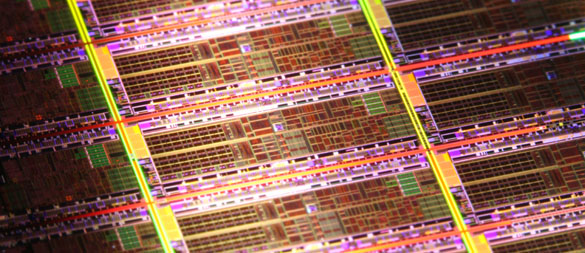The Strain Is Showing: MS, Intel, Trade Potshots At CES
Microsoft's demonstration of Windows 8 running on ARM processors may have been one of the major events of CES, but the OS's 2012/2013 release date has been criticized as a day late and a dollar short. One of the tidbits that slipped out of CES is that IT analysts aren't the only ones frustrated with Redmond's timetable. Intel Senior VP and general manager of the sales and marketing group, Tom Kilroy, revealed at CES for a long time. Us, and others like Dell...We’re very bullish on the tablets segment. It’s very good for the industry as a whole."
It was Microsoft, ironically, that put a major push behind tablets back in 2001, but the resultant market flop and the need to focus on other top-priority issues like XP security, may have left the company simultaneously distracted and gun-shy. With Windows 7 mired in UI issues, there's no guarantee Win 7 will penetrate the new market, leaving Intel no choice but to take a bifurcated stance on tablets.
Kilroy made it clear that Intel's excitement over tablets is tempered by the belief that the new systems are distinctly consumer-centric. Tablets, according to Kilroy, are designed to create and consume media above all else. This focus makes them a huge potential market, but Intel doesn't think tablets will pose a threat to its core desktop or laptop markets. "For myself, and I’m not a very sophisticated user," Kilroy said, "The tablet still has a lot of limitations.”

Atom, in all its puissant glory
Intel may be focusing on the tablet as a consumer device, but it's far from blind to other possibilities. Vendors like HP and RIM have already aimed tablets at the enterprise market and they're the tip of the proverbial iceberg. There are any number of markets that could benefit enormously from tablets, including both the education and medical fields. Intel definitely wants to be a player in these markets; the company's "Atom Everywhere" slogan reflects its long-term plans. The fact that Windows 8 Tablet Edition won't be available for years, however, puts quite a dent in enterprise product development.
The two companies have effectively crossed each others' stars. MS's decision to prominently talk up an OS two years away running on a rival's CPU is a shot over Intel's bow and the CPU manufacturer definitely returned in kind. With non-Intel, non-Microsoft products coming on strong, the Wintel alliance is facing a difficult battle for dominance at a time when neither company is in a position to reinforce the other. As things are now, we expect to see a number of Atom + Windows 7 tablets on the market, but we're also betting Intel turns up the heat when it comes to Android and Meego development.
It was Microsoft, ironically, that put a major push behind tablets back in 2001, but the resultant market flop and the need to focus on other top-priority issues like XP security, may have left the company simultaneously distracted and gun-shy. With Windows 7 mired in UI issues, there's no guarantee Win 7 will penetrate the new market, leaving Intel no choice but to take a bifurcated stance on tablets.
Kilroy made it clear that Intel's excitement over tablets is tempered by the belief that the new systems are distinctly consumer-centric. Tablets, according to Kilroy, are designed to create and consume media above all else. This focus makes them a huge potential market, but Intel doesn't think tablets will pose a threat to its core desktop or laptop markets. "For myself, and I’m not a very sophisticated user," Kilroy said, "The tablet still has a lot of limitations.”

Atom, in all its puissant glory
Intel may be focusing on the tablet as a consumer device, but it's far from blind to other possibilities. Vendors like HP and RIM have already aimed tablets at the enterprise market and they're the tip of the proverbial iceberg. There are any number of markets that could benefit enormously from tablets, including both the education and medical fields. Intel definitely wants to be a player in these markets; the company's "Atom Everywhere" slogan reflects its long-term plans. The fact that Windows 8 Tablet Edition won't be available for years, however, puts quite a dent in enterprise product development.
The two companies have effectively crossed each others' stars. MS's decision to prominently talk up an OS two years away running on a rival's CPU is a shot over Intel's bow and the CPU manufacturer definitely returned in kind. With non-Intel, non-Microsoft products coming on strong, the Wintel alliance is facing a difficult battle for dominance at a time when neither company is in a position to reinforce the other. As things are now, we expect to see a number of Atom + Windows 7 tablets on the market, but we're also betting Intel turns up the heat when it comes to Android and Meego development.

